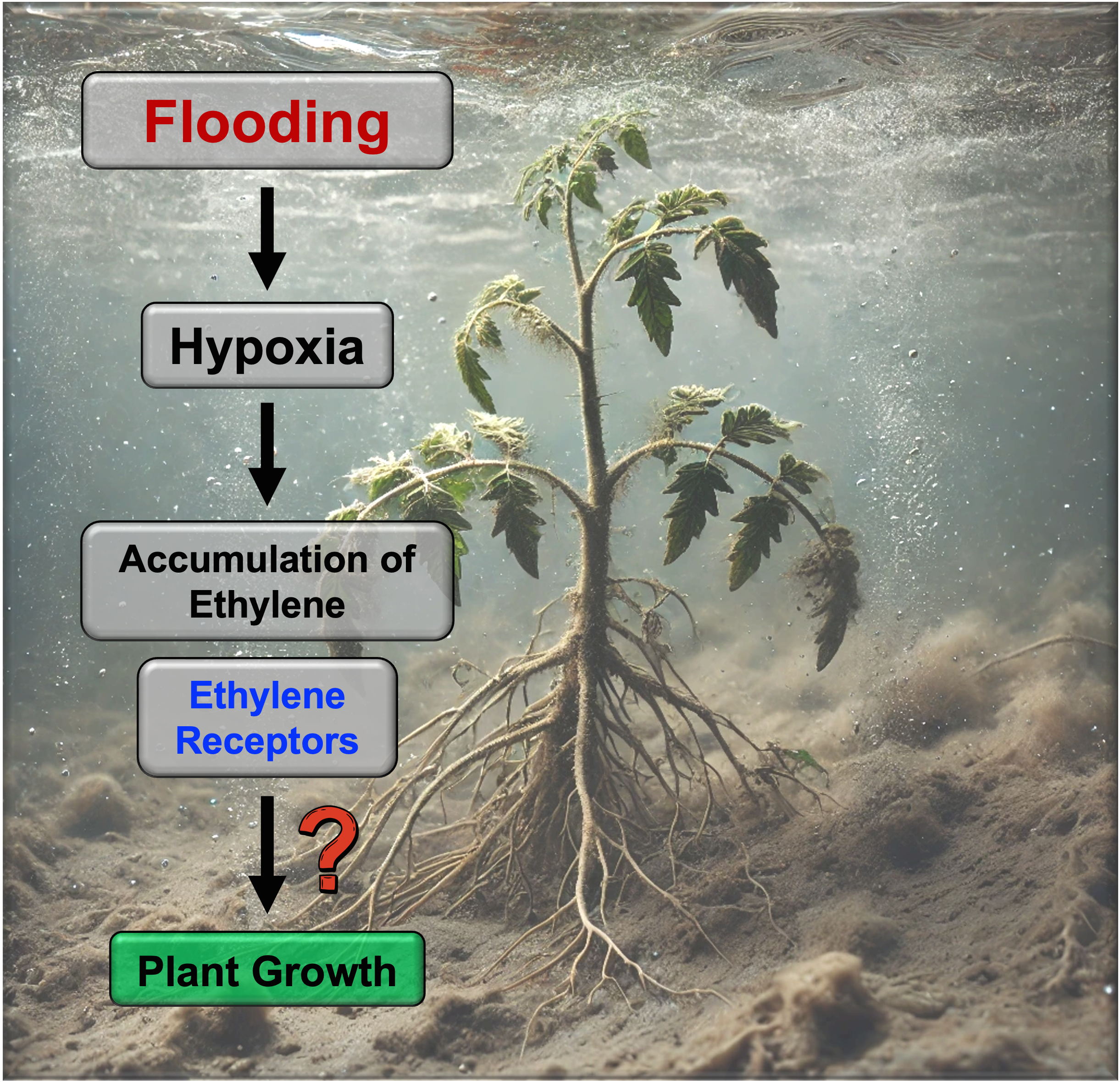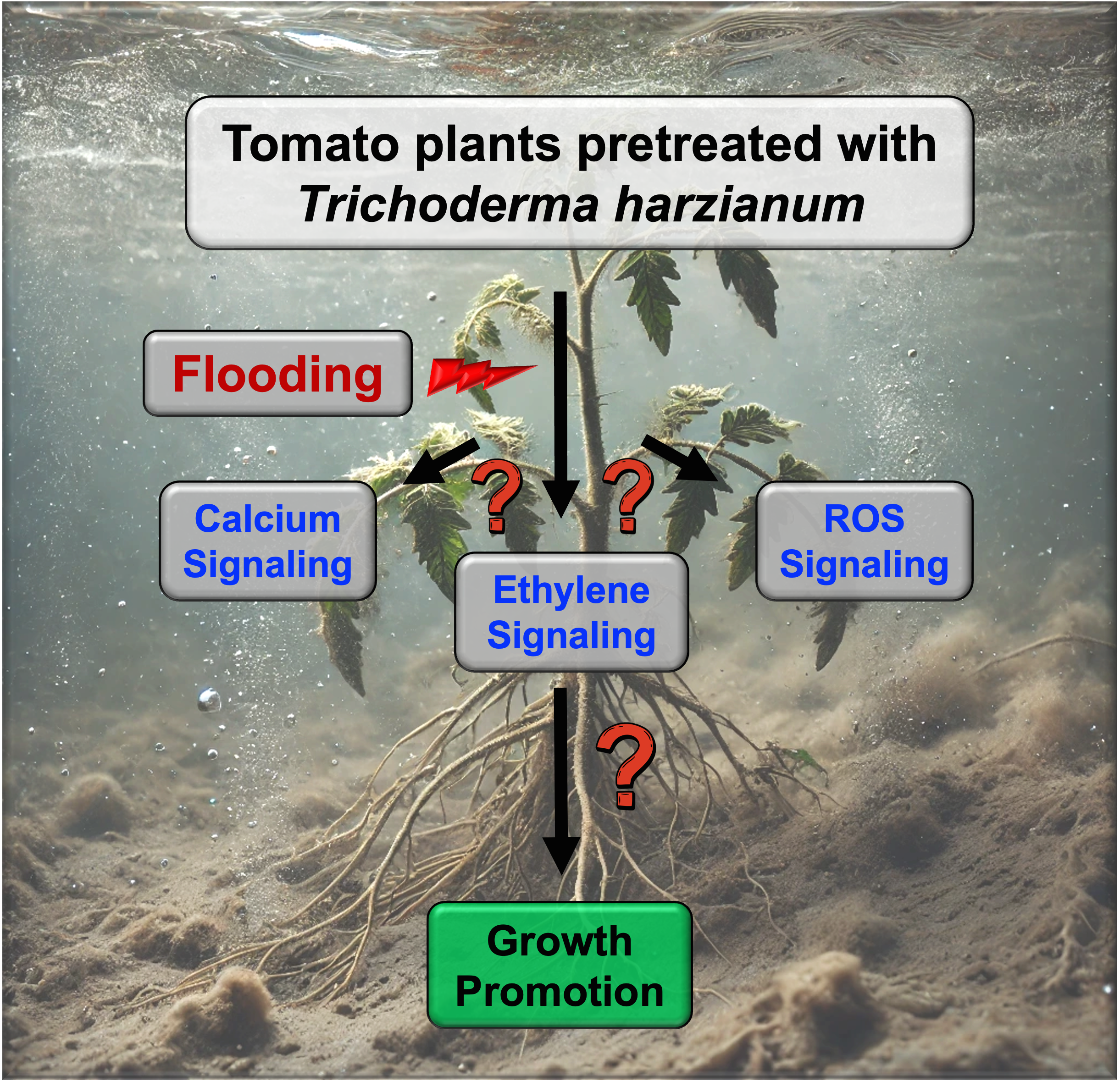Research Focus:
Our lab is centered on understanding how plants perceive and respond to environmental stresses through the signaling of ethylene, a gaseous plant hormone. Ethylene is perhaps best known to the public for its role in fruit ripening, responsible for the familiar saying: “one bad apple spoils the bunch.” However, in plants, its influence extends far beyond fruit ripening, regulating numerous developmental and physiological processes such as seed germination, senescence, abscission, response to various biotic and abiotic stresses, and growth regulation.
Ethylene serves as one of the central coordinators of plant life (Bakshi et al. 2015a), but under extreme conditions such as flooding, it accumulates to high levels, shifting from a developmental regulator to a vital stress signal. Despite its importance, the role of receptor-mediated ethylene perception during flooding remains poorly understood. Flooding also imposes hypoxia (Bakshi et al. 2025), altering calcium (Ca²⁺) (Bakshi et al. 2023) and reactive oxygen species (ROS) signaling, paralleling stresses experienced by plants grown in spaceflight. Our research program seeks to define how receptor-mediated ethylene perception integrates with other signals to guide plant survival.
Sub-functionalization of Ethylene Receptor Isoforms in Plant Flooding Responses:
Ethylene is a central regulator of plant stress physiology, yet the roles of its receptor isoforms under flooding stress remain poorly understood. The five ethylene receptors in Arabidopsis thaliana have undergone sub-functionalization, with some members displaying opposing roles in specific traits. For example, ETR1 and ETR2 exert contrasting effects on seed germination by altering sensitivity to abscisic acid, underscoring the functional diversity encoded within receptor domains (Bakshi et al. 2015b; Bakshi et al. 2018). Building on these findings, this project seeks to unravel how receptor sub-functionalization shapes plant survival strategies under flooding and low-oxygen stress conditions, with implications for enhancing crop resilience in flood-prone areas.
This project broadly investigates how different ethylene receptor isoforms contribute to plant growth and stress responses under flooding, how structural features within receptors influence their signaling roles, and how these pathways connect into broader networks that regulate survival. By combining molecular, cellular, and imaging approaches, we aim to uncover the dynamic hierarchies that shape receptor function in plants facing environmental challenges.
Role of Ethylene-ROS-Calcium Signaling in Spaceflight-Induced Hypoxic Responses:
Spaceflight is a stressful environment, posing unique challenges to plant growth, where the absence of gravity alters water distribution, leading to surface tension-driven adhesion and conditions that mimic flooding-induced hypoxic stress. Within spacecraft, the accumulation of the volatile hormone ethylene further complicates plant growth and development. While ethylene is a well-known regulator of flooding responses on Earth, its role in spaceflight remains poorly understood. In my postdoctoral work at UW-Madison, I identified low-oxygen responses, oxidative stress, and cell wall remodeling as key features of plant adaptation in space, with transcriptomic data revealing strong induction of ethylene signaling components similar to terrestrial flooding. Building on these findings, the Bakshi Lab will investigate how ethylene, ROS, and calcium signaling integrate to regulate hypoxic stress responses in spaceflight and ground-based simulators. The outcomes will inform strategies for sustainable plant cultivation for future space exploration.
This project seeks to understand how ethylene and ROS signaling shape plant responses to spaceflight-induced hypoxia, while also leveraging ground-based simulators to probe the effects of microgravity and low oxygen. A central focus is to uncover how ethylene, ROS, and calcium signals intersect to coordinate adaptive responses, providing insights into the signaling networks that support plant growth in spaceflight and analogous terrestrial environments.
Role of Ethylene-ROS-Calcium Signaling in Regulating Plant-Microbe Interactions:
Plant-associated microbiota are key regulators of growth and resilience, shifting dynamically under stresses like flooding. Beneficial fungi such as Trichoderma harzianum enhance tolerance and promote growth, yet the signaling networks guiding these interactions remain unclear. As a co-I on a NASA-funded project at UW-Madison (NASA Grant #80NSSC21K0577), I identified that ROS signaling is central to tomato-Trichoderma interactions, with pre-treatment reducing oxidative damage and altering ethylene and calcium pathways. These results point to an integrated ethylene-Ca²⁺-ROS signaling network as a driver of beneficial plant-microbe communication.
This project explores how ROS signaling influences plant-Trichoderma interactions during flooding, with a focus on how ethylene-ROS crosstalk contributes to beneficial microbe-mediated growth promotion. We also aim to capture the dynamics of calcium signaling within this plant-fungus system, providing new insights into how ethylene-Ca²⁺-ROS signaling pathways intersect to shape beneficial interactions under stress.
Research Opportunities:
The Bakshi Lab is committed to training the next generation of plant biologists. We welcome graduate, undergraduate, and motivated high school students who are excited to explore fundamental and applied questions in plant biology. Our research spans plant stress physiology, signaling pathways, plant responses to spaceflight, and plant-microbe interactions, offering opportunities to engage with cutting-edge approaches.
If you are interested in joining our team, please contact Dr. Arkadipta Bakshi (bakshia@wfu.edu) with your CV and a brief statement outlining your interests and background. We value curiosity, collaboration, and a strong desire to learn.



